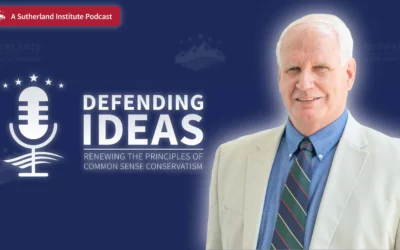
Written by William C. Duncan
February 8, 2024

On Feb. 4, Utah Gov. Spencer Cox joined 14 other governors in Texas to discuss the challenge that state is experiencing as large numbers of individuals are illegally crossing the Texas border, creating what Cox described as a situation that has become “inhumane, unsustainable and unacceptable. … [T]he unrestrained influx of migrants and drugs threatens the security of every state and the nation.”
Responding to this situation has become dramatically more complicated, however, due to conflicts between the state and federal government over the nature of their responses. If federal and state policymakers are ever to resolve this politically thorny issue, they will need to understand their respective roles in responding to the influx of migrants.
Border dispute
Texas charges that the federal government has failed to enforce border security by abandoning prior control efforts. The federal government, in turn, has complained that Texas officials are interfering with federal efforts to respond to migration.
Most recently, Texas installed concertina wire to deter border crossings, but federal officials cut it in one place. State officials challenged that action in court, but the federal government alleged that the wire prevented them from responding to provide medical assistance to migrants. A federal district court was sympathetic to Texas’ claims that cutting the wire “for purposes other than a medical emergency, inspection, or detention” interfered with the state’s property. The court, however, concluded that the concept of “sovereign immunity” (the idea that the United States cannot be sued unless it consents) barred the lawsuit.
The U.S. Court of Appeals for the Fifth Circuit granted Texas’ application for an injunction ordering federal officials not to interfere with Texas’ concertina wire obstacle. The Fifth Circuit rejected the immunity claim, based on a federal statute that waived immunity for lawsuits against the federal government, agreeing with the district court that Texas was being harmed because it had lost control of state property. Thus, it issued an injunction against federal interference with Texas’ obstacle. The U.S. Supreme Court, with four justices disagreeing, ended the injunction without a formal opinion.
Constitutional guidance
The Constitution’s delegation of specific authority to the national government while reserving to the states all other authority is a critical feature of our constitutional order. Even prior to its enunciation in the 10th Amendment, James Madison explained the intended division in The Federalist Papers, No. 45: “The powers delegated by the proposed Constitution to the federal government are few and defined. Those which are to remain in the State governments are numerous and indefinite.”
Several constitutional provisions are relevant to the Texas dispute. These include the authority given to Congress to determine how a person may become a U.S. citizen and to “repel invasions” (Article I, Section 8), the duty of the federal government to “protect each of [the States] against Invasion” (Article 4, Section 4), and the authority of the states to exercise any power not delegated to the national government (Amendment 10).
Interestingly, Madison suggested in Federalist 45 that the federal government’s power would “be exercised principally on external objects, as war, peace, negotiation, and foreign commerce” and that the “operations of the federal government will be most extensive and important in times of war and danger.” By contrast, the “powers reserved to the several States will extend to all the objects which, in the ordinary course of affairs, concern the lives, liberties, and properties of the people, and the internal order, improvement, and prosperity of the State.”
The current dispute seems to pit these roles against one another.
Possibility of resolution
Congress could help to alleviate the dispute by giving clear direction about border security, but so far it has not done so. This is in part because the Senate has decided to address the issue only as linked to unrelated matters, themselves complex and contentious. This makes resolution more elusive.
Absent congressional action, the executive branch can enforce current laws, and the states have authority to act, perhaps in new ways. States have much authority to do so – on subjects from benefits to immigrants to protections from criminal acts, and, of course, enforcement of drug and human trafficking laws. By contrast, federal actions that can reasonably be perceived as hostile to or indifferent to state interests will likely exacerbate existing tensions and prevent necessary security and humanitarian initiatives.
Responding to organized crime, securing national borders against potential hostile incursions, protecting citizens and migrants, and stemming the trade in drugs: These are certainly the types of concerns that the constitution’s framers wanted to make sure the state and federal governments could effectively address. This cannot happen when one level of government or the other acts outside of their constitutional authority and at variance with the other. Resolving difficult policy issues begins with understanding the constitutional policy authority of each level of government.
Jimena Villanueva Kiser provided research for the preparation of this post.

Insights: analysis, research, and informed commentary from Sutherland experts. For elected officials and public policy professionals.

- An unprecedented influx of migrants crossing the U.S. border has resulted in litigation between Texas and the United States over the responsibility to secure the nation’s borders.
- The U.S. Constitution gives both the federal government and the states the authority to address the types of issues raised by the situation in Texas.
- In the absence of congressional direction, the executive branch and the states must enforce existing laws and enact others to address novel circumstances. But constructive solutions are hampered when – like now – they are acting at odds with one another.
Read More
Protecting property rights against government overreach
While governments can continue to regulate land use, these regulations and fees must be justified by a government interest and proportional to the effect of the development’s impact on that interest.
Do we need to care about the Utah State Board of Education?
For any Utah voters who also feel like K-12 public education is headed in the wrong direction, learning about the candidates running for a seat on the Utah State Board of Education (USBE) is a wise choice this election season.
Defending education choice the right way
Education choice has exploded in popularity across the nation in recent years. So why does it remain a contentious point of debate in some parts of the country?


